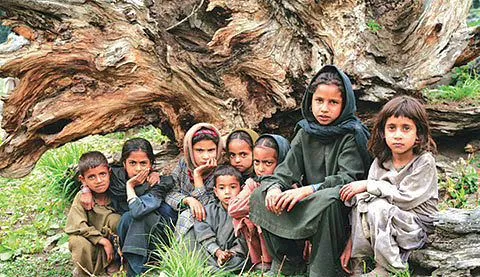Srinagar: Come summer in Kashmir, nomadic population of Jammu and Kashmir start moving towards the valley for onward trekking to high pastures. Kashmir offers best and stimulant grazing for the livestock, which keeps roaming whatever the weather conditions prevail on higher reaches.
Thus far, the movement of shepherds and cattle breeders used to be a common phenomenon in Jammu areas up to Khanabal via nearly 290 km national highway. However, the UT administration of Jammu and Kashmir, for the first time, put a halt to laborious exercise of moving over vehicularly congested roads and deployed 40 Road Transport Corporation trucks for onward journey of cattle and cattle breeders up to the high pastures.
Every year by ending March, thousands of nomads begin their annual seasonal journey with lakhs of sheep and goats from Jammu region to reach the Kashmir valley. These families embark on their journey towards the alpine pastures for grazing during the summer before returning to warmer districts of Jammu region in October as the temperature goes down.
The hard journey from Jammu on foot to greener pastures of Kashmir used to consume lot of precious time for nomads leading to financial loss and physical strain. The hardships of these nomads further aggravated over the years due to dwindling number of primary source of transportation, horses. Transportation of their household goods and cattle to the upper reaches through tricks and load carriers was a long pending demand of these nomads before the administration.
On the directions of Lieutenant Governor, Manoj Sinha, the department initiated a special project envisaging a transhumant support system including transit accommodations and transport facilities for the migratory population.
In line with the announcement made by Lieutenant Governor to minimize hardship being faced by the tribals during seasonal migration, the Tribal Affairs Department procured a fleet of 40 trucks for transporting around 30,000 families from Jammu to Kashmir via Mughal road and National Highway-44 connecting Jammu with Srinagar. These trucks were procured by the department through J&K Road Transport Corporation.
This initiative has been taken on the direction of Lieutenant Governor Manoj Sinha who has announced various steps for welfare of tribals of J&K”, Dr Shahid Iqbal Choudhary, Secretary, Tribal Affairs Department said during the flagging of trucks. He said that this initiative will minimize the hardships being faced by nomads during seasonal migration adding that this is for the first time in the history of J&K that livestock of tribals is being transported to highland pastures in trucks.
Pertinently, Jammu and Kashmir government had earlier announced provision of transport/freight services for the migratory tribal population during the annual migration to highland pastures. There was persistent demand from the migratory tribal community that they face a lot of hardships during migration due to traffic jams and other hindrances and to make their journey smoother they should be provided some transportation mode.
It was observed that sometimes due to harsh weather conditions there used to occur huge losses of livestock and other damages to tribal families. The budget announcement made by the Finance Minister mentioned that transportation viz-a-viz transit facilities will be provided to the migratory tribal population.
The transportation system put in place by the Tribal Affairs Department will reduce the travel time from 20-30 days on foot to 1-2 days while it will also help in smooth management of traffic. These trucks have been deployed both on National Highway-44 and Mughal Road. More trucks are being inducted this year by the department to ensure coverage of 100% families.
Lieutenant Governor has committed to provide transportation support and transit facilities to 100 per cent migratory tribal population on National Highway and Mughal Road.
Meanwhile, funds to the tune of Rs 6.80 crore have been released in favour of JKSRTC for procurement of trucks to provide transportation facilities to the migratory tribal families.
It is pertinent to mention here that the tribal affairs department is establishing transit accommodations at eight different locations for the convenience of migratory tribal population at a cost of Rs 28 crore and two of them are nearing completion.











